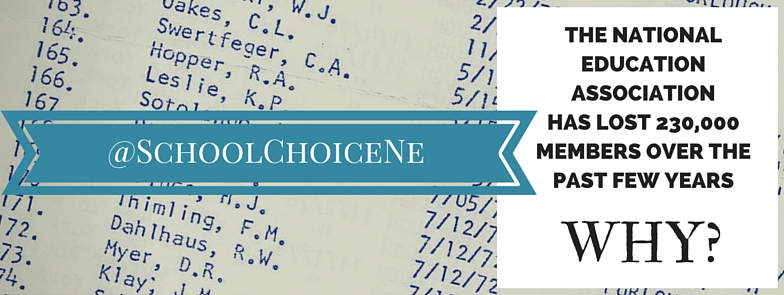|
by Rachel Terry What motivates you to do well in your profession? I'm a freelance writer, and I know pretty quickly if clients like the work I do for them. If they don't like my work, they find another writer. If I miss a deadline, I will probably lose the chance to write for that client again. If I do a knock-down job, not only will I probably get more work, but I might just get a bonus on top of a timely paycheck. This kind of feedback motivates me to do my best. I have financial incentives for being responsive to clients and for producing the best work I possibly can. I also know that financial consequences inevitably follow lazy or sloppy work. This feedback loop is familiar to most workers in most industries in the free world. Hair stylists who do great work can command higher rates, and accountants who manage finances well earn new clients. It seems that about the only industry where the feedback loop is broken is in union-commandeered public K-12 education. And here's why: The following two paragraphs are from the Lincoln Education Association's November 12, 2015 newsletter to its members: The LPS Seniority and Assignment lists are used to determine who gets surplussed (reassigned) when there have been changes in a building’s enrollment, or budget or program changes in the district. The lists are also used if there is going to be a reduction in force (RIF or layoff) if circumstances are such that there is no vacancy for a person in their area(s) of certification or endorsement anywhere in the district. Let's break this down to the essentials:
This is unfair to students, teachers, and administrators. Students: It is unfair to sit students down in classes headed by teachers who may or may not have any interest in teaching. Some teachers are passionate about their jobs, and these are the teachers who will be remembered for many years to come and who will light fires in their students' minds. But some teachers who are high on the seniority list know they're "safe," and all they have to do is wait out their time until they receive their pensions. Their compensation is not tied to their job performance or their students' successes, so students will suffer due to the apathy created by this system. Teachers: Teachers who continue to improve their skills and put their all into their teaching are indeed heroes, especially when they're working in a system that does not reward their efforts. By not giving incentives for teachers to perform well, this system deprives teachers of the motivation most of us require in order to learn and grow in our professions. If I knew that I would continue to be paid for freelance writing jobs no matter what the quality of my writing, I would probably never improve. It's a tragedy when we lose dynamic youthful teachers because they're too far down on the seniority list. Too many ambitious teachers have left for the private sector where their talents are rewarded and cultivated. Ultimately, it's our children who miss out. Administrators: Principals and other administrators face scrutiny about how well their students are doing, but they have very little control over the hiring and firing of their staff. Given an employee with a "'safe' seniority number of 2020," a principal can try to cajole this person into exerting effort and working hard, but there's no guarantee that #2020 will comply. In the real world, a boss would give her employees evaluations with specific suggestions for improvement. If they fail to meet expectations, the boss will let that person go and hire someone who loves teaching and wants to work hard. Without the ability to make decisions like this, administrators have their hands tied. It must be incredibly frustrating. How School Choice Can Help Nebraska is one of the last states to enact school choice measures. Most states now tie student test scores to teacher evaluations, giving teachers incentives to ensure that their teaching methods are truly helping students to learn. Only five states, including Nebraska, have no formal policy linking student test scores to teacher evaluations. Monopolies don't have to prove their value to the public. Their existence suffices. There's an even greater incentive than improved teacher evaluations, however, and that's school choice. When all parents have real educational choices to consider, the best options thrive. Schools that want to attract students will hire, train, and inspire the best teachers and then do their best to hang on to these teachers once they find them. In this environment, no Seniority List is needed. The environment in schools like this is different. Kids can feel the difference, and it's invigorating. Teachers can feel the difference; it's contagious. There's energy and focus. We can have that. The teacher's unions in Nebraska will try to convince you that there's no other way, that to criticize unions is to criticize teachers. But that's just not true. Over the past few years, the National Education Association has lost 230,000 members, and it's not because teachers are going the way of the dinosaurs. It's because more and more teachers are realizing that they don't have to be a number on a list. They can work in environments where they're rewarded for their innovative good ideas. They can be "safe" the way the rest of us can be safe in our various careers: by serving our customers well. That's school choice. If you happen to read to the second page of that LEA newsletter, you'll see the conclusion the LPS union bosses have come to: In Summary: The seniority lists are critical. Teachers, you deserve better. Join the school choice movement, and you can have better.
1 Comment
Jeremy
2/17/2020 07:35:01 pm
Being born and raised in Nebraska and a victim of its government schools, I am very aware of the incentive problems for not only teachers, but also for students. I also know that there is an alternative. As an ESL/English teacher in Korea, I work in a private setting. If a teacher doesn't perform well, they are ousted very quickly. But the standards also apply to students. If a student has bad manners (which is rare), I kick them out of the class, or I don't allow them to sign up for the next term. I am very selective about who I choose to teach. Private teaching has many advantages for students who want to learn and for teachers who want to teach.
Reply
Your comment will be posted after it is approved.
Leave a Reply. |
|


 RSS Feed
RSS Feed